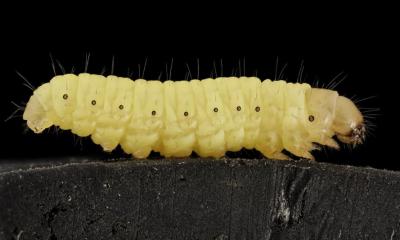

by Amanda Froelich, True Activist
The wax worm has a special compound in its digestive tract that biodegrades polyethylene plastic, converting it into a form of alcohol found in antifreeze.
At present, landfills around the globe are full of polyethylene shopping bags, an item which takes approximately 100-400 years to degrade naturally. Not only does plastic slowly leach chemicals into the environment when it is discarded in nature, it is not uncommon for wildlife to ingest plastic bags or other items, harming themselves and in some cases, dying.
Fortunately, a handful of researchers may have discovered a potential solution to the global plastic conundrum. As the Daily Mail reports, scientist Federica Bertocchini accidentally discovered that the wax worm, a caterpillar known for ingesting the wax within beehives, is able to devour and biodegrade polyethylene plastic. The insect converts the material into a form of alcohol found in antifreeze.
The scientist who works at the Institute of Biomedicine and Biotechnology of Cantabria uncovered the worm’s unique abilities when she attempted to clean up a wax worm infestation in one of her home beehives. Reportedly, she collected the worms then placed them in a plastic bag, hopeful that they would die. After leaving the bag in her home, Bertocchini was stunned to return and discover that the worms had chewed through the plastic and escaped.
Disgusted yet infatuated by the finding, she decided to examine the species more closely. In a new paper published in Current Biology, Bertocchini explains how 100 of the worms can chew through a normal polyethylene shopping bag in 40 minutes.

Because Bertocchini and her colleagues believed the worms had simply chewed through the plastic and shredded it, they conducted a somewhat nauseating scientific experiment to discern the worms’ abilities. First, they pureed the worms, then they left the paste in contact with the plastic itself and waited. Incredibly, 13% of the plastic has dissolved and degraded into ethylene glycol (the main component in antifreeze) after 14 hours.
The results helped the scientists conclude that the worms had not shredded the plastic. Rather, they have a compound in their digestive systems that is capable of breaking down and digesting the material. As Inhabitat points out, there have been several attempts to degrade plastic using fungus and bacteria, but none have proven to be as efficient as worm paste.
More research undoubtedly needs to be conducted, but it is possible that the wax worm could be an instrumental part of solving the global plastic crisis. What are your thoughts? Please comment below and share this news!
http://www.trueactivist.com/plastic-eating-caterpillar-could-help-solve-the-globe-waste-crisis/

